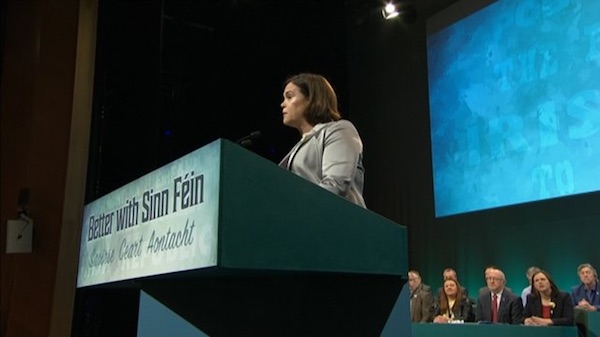
The Sinn Fein annual conference is taking place this weekend with the party facing an election to the Belfast Assembly early next month and a potential second general election to the Leinster House parliament in Dublin. Over 2,500 delegates are attending the annual conference in the Convention Centre in Dublin.
With little change likely in the Six Counties under Stormont power-sharing, it is the new left-wing political dynamic in the 26 Counties and the continuing failure of the two right-wing parties to form a government which is the focus for delegates this weekend.
Sinn Fein deputy leader Mary Lou McDonald told the ardfheis last night that the only difference between Fine Gael leader Enda Kenny and Fianna Fail leader Micheal Martin is “which of them is top dog”.
In a sharp attack on the two parties, she said the big issues were left to drift as the two leaders jockeyed for position in an eight-week “farce played out on a grand scale”.
Ms McDonald warned the two parties that while they did not want Sinn Fein either in government or leading opposition, “Sinn Fein is not going away”.
And to applause she said that her party “will challenge Fine Gael-Fianna Fail every time they try to short change the Irish people.
“Sinn Fein from this ardfheis repeats our call for the full abolition of water charges, nothing less, no half measures, no convenient fig leaves will do,” she said of the issue that most divides the two parties in government formation discussions.
“We will not prop up a Fine Gael government that favours only the wealthy and disregards the rest,” she said.
“We will not play the game of make believe that Fianna Fail are acting responsibly or in the ‘national interest’. They act only in their own narrow self- interest.”
Her party would be the “leader of opposition to bad government” and in anticipation of a possible early election, she said “we want to be and we will be part of a government that champions the people.
“We will face the challenge of government when it is afforded to us by the people with energy and integrity.”
Party leader Gerry Adams was asked if Sinn Fein would consider a partnership government if offered. “Fine Gael and Fianna Fail ruled us out so that question does not arise,” he said. The two parties should “set a deadline” for talks or call an election. “I think there is not much patience left,” he said.
Ms McDonald said Sinn Fein had held talks with other parties and individuals with whom they share common objectives, but noted “there are damn all differences between Fianna Fail and Fine Gael”.
The prospects of a deal on a minority government suffered a blow earlier this week when the Labour Party said it would not continue in government alongside its coalition partners, Fine Gael. Another plan to secure power by including more than ten independent TDs, while still under discussion, has been heavily criticised in the media after it was revealed that some 13 billion euro had been sought by the TDs for projects in their own constituencies.
Enda Kenny and Micheal Martin are expected to speak again shortly as efforts to form a new government, approaching 60 days after the general election, continue.
Their negotiating teams are also on standby to resume talks over the weekend after they failed to reach agreement on housing, health, childcare and Irish Water, amongst other issues.
Meath Fianna Fail TD Thomas Byrne denied a series of reports of a deal to ‘postpone’ the hated water charges. “The media reports are all just spin,” he said.
‘AN AGREED IRELAND’
The first night of the Sinn Fein Ard Fheis also saw a discussion of a significant new proposed policy document. The party’s Deputy First Minister in the North, Martin McGuinness, and party chairman Declan Kearney recommended the document, “Towards and Agreed and Reconciled Future”, published to coincide with the ardfheis.
In a notable change of direction for the party, Mr McGuinness spoke of the goal of an “agreed Ireland” rather than a united Ireland, using the phrase three times in his keynote speech on Friday night.
“A century on from the Rising and 35 years from the hunger strikes an agreed Ireland is desirable. An agreed Ireland is achievable,” said Mr McGuinness. “The vision of 1916 is alive and well, as relevant and inspiring today as it was a century ago. Together we can make it a reality.”
He also said that republicans had a “responsibility and a duty to reach out to the unionist community in a spirit of generosity” even if “others don’t always reciprocate”.
![[Irish Republican News]](https://republican-news.org/graphics/title_gifs/rn.gif)
![[Irish Republican News]](https://republican-news.org/graphics/title_gifs/harp.gif)

